Personal Sports
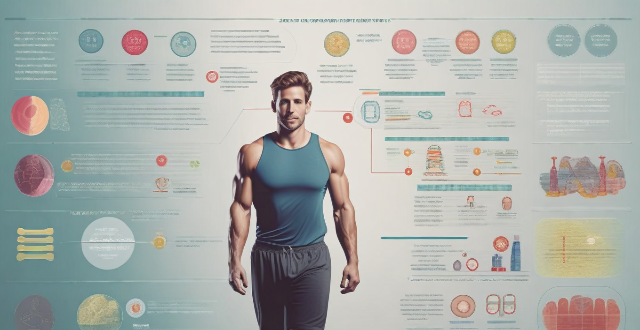
How does sports contribute to personal growth ?
Sports significantly contribute to personal growth by enhancing physical fitness, mental agility, emotional well-being, and life skills such as resilience, leadership, and adaptability. Regular participation not only maintains a healthy weight but also fosters discipline, self-esteem, and teamwork. Overall, sports are instrumental in developing well-rounded individuals capable of facing life's challenges with confidence and competence.

Can sports help individuals achieve their personal goals ?
Sports have been an integral part of human civilization for centuries. They are not only a source of entertainment but also serve as a platform for personal growth and development. Many individuals engage in sports to achieve their personal goals, be it physical fitness, mental well-being, or social interaction. One of the most obvious benefits of sports is improved physical health. Engaging in regular physical activity can lead to reduced risk of chronic diseases such as heart disease, diabetes, and obesity, strengthened bones and muscles, improved cardiovascular health, and better sleep quality. Sports can also aid in weight management by burning calories and increasing metabolism, leading to weight loss or maintenance. Engaging in sports can help reduce stress levels by releasing endorphins, which are natural mood boosters. This can lead to improved mood and reduced anxiety, as well as better coping mechanisms for stressors in life. Participating in sports can also boost self-esteem by providing a sense of accomplishment and pride, leading to increased confidence in one's abilities and improved body image and self-worth. Sports often require teamwork and communication, which can help individuals develop these skills outside of the sporting arena. This can lead to improved interpersonal relationships and enhanced leadership abilities. Participating in sports can also provide networking opportunities, allowing individuals to meet new people who share similar interests. This can lead to new friendships and professional connections, as well as an expanded social circle and support system. In conclusion, sports can play a significant role in helping individuals achieve their personal goals. Whether it be physical fitness, mental well-being, or social interaction, sports offer numerous benefits that can positively impact various aspects of one's life. By engaging in sports regularly, individuals can work towards achieving their personal goals while enjoying the many benefits that come with it.

Can playing sports improve one's self-confidence and personal growth ?
Playing sports can contribute to self-confidence and personal growth by developing skills, overcoming challenges, fostering teamwork and support, promoting discipline and responsibility, encouraging goal setting and achievement, and enhancing social interaction and empathy. Incorporating sports into one's lifestyle can be highly beneficial for overall well-being and personal development.

How do sports help in building character and personal growth ?
The text discusses the various ways in which sports can contribute to building character and promoting personal development. It highlights how sports can help develop discipline, promote teamwork, cultivate perseverance, encourage leadership, enhance self-esteem, teach adherence to rules, facilitate social interaction, improve physical health, and teach individuals how to handle pressure. The author emphasizes that the lessons learned through sports participation can translate into valuable life skills that are essential for success both in sports and beyond. Overall, the text suggests that sports offer an array of benefits that stretch far beyond physical fitness and play a significant role in shaping character and fostering personal growth.

How does team sports contribute to personal growth and development ?
Team sports contribute significantly to personal growth and development by helping individuals develop various skills, qualities, and values essential for success in all aspects of life. These include communication skills, leadership abilities, teamwork and collaboration, discipline and responsibility, goal setting and achievement, emotional intelligence, and time management. Participating in team sports can help individuals become well-rounded individuals who are prepared for whatever challenges lie ahead.

How can sports help individuals develop leadership skills and personal growth ?
Participating in sports can help individuals develop leadership skills and foster personal growth by enhancing goal-setting, teamwork, resilience, decision-making under pressure, accountability, confidence building, discipline, physical health, emotional intelligence, and social interaction.

Can sports be a tool for personal growth and self-discovery ?
Sports offer numerous opportunities for personal growth and self-discovery, including building resilience and determination, developing teamwork and communication skills, enhancing self-discipline, promoting emotional health, discovering passion and purpose, and cultivating mindfulness and focus.
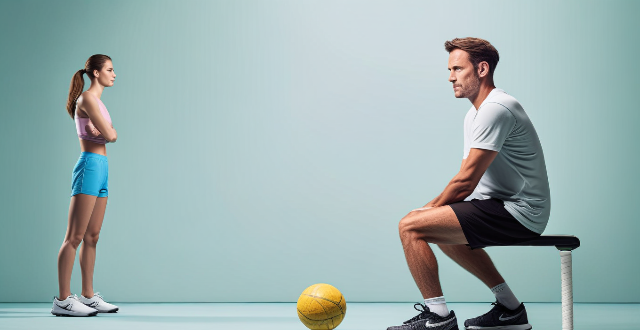
What is the difference between a personal trainer and a sports coach ?
This article compares and contrasts the professions of personal trainers and sports coaches, highlighting their similarities and differences in terms of clientele, goals, training programs, feedback and guidance, and areas of specialization. Personal trainers work with individuals to improve their overall health and fitness levels, while sports coaches work with athletes or teams to improve their performance in a specific sport. The article provides a comprehensive overview of the key differences between these two professions, helping readers understand the unique roles and responsibilities of each.
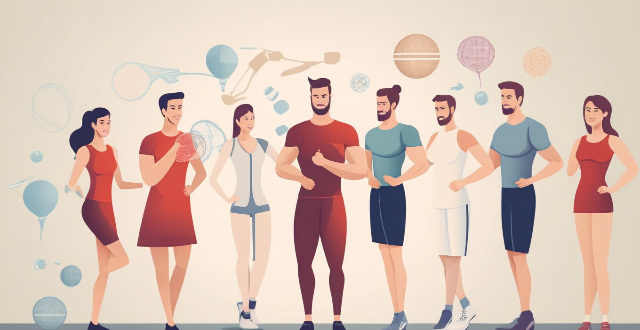
Can team sports help in building stronger personal connections and reducing stress ?
Team sports can help in building stronger personal connections and reducing stress by enhancing social interactions, developing communication skills, fostering empathy and understanding, promoting physical activity, providing a distraction from stressful situations, and promoting mindfulness.
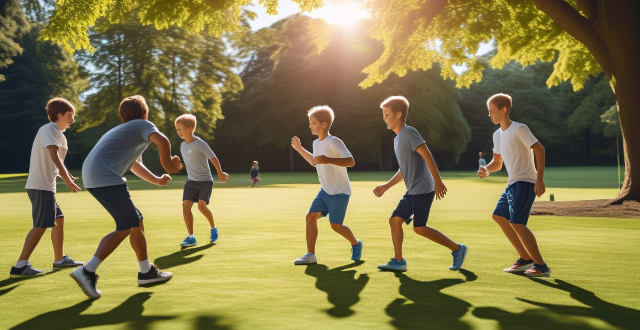
What impact do sports have on an individual's social skills and personal growth ?
Sports play a crucial role in shaping an individual's social skills and personal growth. Engaging in physical activities not only promotes physical health but also enhances mental well-being, develops teamwork and leadership abilities, and fosters communication skills. Participating in sports requires individuals to work together as a team, take on leadership roles, and communicate effectively. These skills are essential for success in both personal and professional life. Additionally, sports provide opportunities for self-discipline, confidence building, and resilience development. By participating in sports, individuals can develop valuable skills that are transferable to all aspects of life.

Can sports be used as a tool for personal growth and self-improvement ?
The text discusses the various ways in which sports can be used as a tool for personal growth and self-improvement. The author highlights the following aspects: - Mental toughness and resilience: Facing challenges and overcoming failure through sports can cultivate mental toughness and build resilience. - Teamwork and communication: Working together and effective communication are essential skills developed through team sports, which can enhance interpersonal relationships and group dynamics. - Discipline and time management: The structured approach required in sports can improve personal organization and time management skills, along with goal setting and strategic thinking. - Physical health and well-being: Sports contribute significantly to physical health by promoting fitness and endurance, and can also improve mental health by combating depression and anxiety. - Leadership and initiative: Sports provide opportunities for individuals to step up as leaders and develop problem-solving abilities, encouraging proactive behavior. - Self-confidence and self-esteem: Achieving mastery in sports can boost an athlete's confidence and self-esteem, fostering a positive self-image. - Adaptability and learning agility: Sports require athletes to adapt quickly to new tactics or game plans, encouraging a mindset of continuous learning that extends beyond the sporting realm. Overall, the text emphasizes that sports offer a comprehensive toolkit for personal development, encompassing benefits that extend far beyond the playing field. Engaging in sports can be a powerful catalyst for self-improvement and personal growth.

What role does discipline in sports play in achieving personal goals and mental resilience ?
The text discusses the importance of discipline in sports for achieving personal goals and building mental resilience. It outlines key aspects such as setting clear objectives, consistent practice, overcoming obstacles, self-regulation, focus and concentration, and resilience under pressure. The article emphasizes that discipline not only enhances physical performance but also strengthens mental fortitude, enabling athletes to reach their full potential and thrive in their respective sports.

How does sports contribute to self-fulfillment ?
How Sports Contribute to Self-Fulfillment: Sports have a profound impact on self-fulfillment, providing numerous benefits that contribute to personal growth and well-being. From physical fitness to mental health, sports offer a wide range of opportunities for individuals to achieve their goals and find satisfaction in their lives. In this article, we will explore how sports can help you achieve self-fulfillment. Physical Fitness and Health: One of the most obvious ways sports contribute to self-fulfillment is through physical fitness and health. Engaging in regular exercise has been shown to improve overall health, reduce the risk of chronic diseases, and increase longevity. By participating in sports, individuals can maintain an active lifestyle and enjoy the many benefits that come with it. Benefits of Physical Fitness and Health include improved cardiovascular health, weight management, increased energy levels, and better sleep. Mental Health and Well-Being: In addition to physical benefits, sports also contribute to mental health and well-being. Engaging in regular exercise has been shown to reduce stress, anxiety, and depression, while improving mood and cognitive function. By participating in sports, individuals can experience these mental health benefits and find greater fulfillment in their lives. Benefits of Mental Health and Well-Being include reduced stress, improved mood, enhanced cognitive function, and increased resilience. Social Connections and Personal Growth: Another way sports contribute to self-fulfillment is through social connections and personal growth. By participating in team sports or group activities, individuals can build strong relationships with others who share similar interests and passions. These social connections can provide a sense of belonging and support, helping individuals feel more connected to their community and valued by others. Benefits of Social Connections and Personal Growth include building relationships, developing leadership skills, expanding horizons, and personal growth. Achieving Goals and Finding Fulfillment: Finally, sports provide a platform for individuals to set and achieve personal goals, which can lead to a sense of fulfillment and satisfaction in their lives. Whether it's training for a marathon or competing in a local tournament, setting goals and working towards them can provide a sense of purpose and direction in one's life. Benefits of Achieving Goals and Finding Fulfillment include setting personal goals, finding purpose, overcoming challenges, and celebrating success.

Is it necessary to hire a personal coach to improve sports skills ?
Improving sports skills is a common goal for many athletes, from amateur enthusiasts to professional competitors. One question that often arises is whether it is necessary to hire a personal coach to achieve this objective. In this response, we will explore the advantages and disadvantages of hiring a personal coach and provide some recommendations based on individual needs and circumstances. Advantages of Hiring a Personal Coach: Expertise and Experience: A personal coach brings expertise and experience to the table. They have spent years honing their craft and learning the intricacies of their sport. This knowledge can be invaluable when it comes to improving an athlete's technique, form, and overall performance. Customized Training Plans: Personal coaches create customized training plans tailored to each athlete's specific needs, goals, and abilities. This personalized approach ensures that the athlete is receiving the most effective and efficient training possible, which can lead to faster progress and better results. Accountability and Motivation: Having a personal coach provides a sense of accountability and motivation. The coach serves as a mentor and cheerleader, pushing the athlete to reach their full potential while also providing support and encouragement along the way. Injury Prevention and Recovery: Personal coaches are trained in injury prevention and recovery techniques. They can help athletes identify potential risk factors and develop strategies to minimize the likelihood of injuries occurring. Additionally, they can guide athletes through proper recovery protocols after workouts or competitions. Disadvantages of Hiring a Personal Coach: Cost: Hiring a personal coach can be expensive, particularly for top-level coaches with extensive experience and credentials. This cost may not be feasible for all athletes or may require significant financial investment over time. Availability and Accessibility: Personal coaches may not always be available at convenient times or locations for the athlete. This can make it difficult to maintain consistent training schedules or receive timely feedback and guidance. Compatibility Issues: Not all athletes will click with their personal coach, leading to compatibility issues that can hinder progress and enjoyment of the sport. It is important to find a coach who understands the athlete's goals, personality, and learning style. Recommendations Based on Individual Needs and Circumstances: Assess Your Goals and Level of Commitment: Before deciding whether to hire a personal coach, assess your goals and level of commitment to your sport. If you are serious about improving your skills and achieving specific milestones, investing in a personal coach may be worth considering. However, if you are primarily focused on recreational activities or occasional competitions, self-directed training may be sufficient. Consider Your Budget and Resources: Evaluate your budget and resources to determine if hiring a personal coach is financially viable for you. There may be alternative options such as group coaching sessions, online coaching programs, or working with less experienced coaches that offer similar benefits at a lower cost. Research Potential Coaches Carefully: If you decide to pursue hiring a personal coach, research potential candidates carefully. Look for coaches with relevant qualifications, experience working with athletes at your level, and positive reviews from previous clients. Schedule initial consultations to gauge compatibility and discuss your goals and expectations. In conclusion, hiring a personal coach can be beneficial for athletes looking to improve their sports skills by providing expertise, customized training plans, accountability, motivation, injury prevention, and recovery support. However, it is essential to consider individual needs, goals, budget, and resources before making this decision. By carefully evaluating these factors and researching potential coaches, athletes can make informed decisions about whether hiring a personal coach is necessary for them.

How do school sports programs influence the physical activity levels of teenagers ?
School sports programs have a significant impact on the physical activity levels of teenagers. They encourage regular exercise and help develop essential life skills such as teamwork, communication, and leadership. These skills are valuable in personal and professional settings. School sports programs also play a vital role in building healthy habits among teenagers by promoting proper nutrition, rest, and recovery. Finally, school sports programs provide opportunities for personal growth and development through challenging physical and mental activities. Overall, school sports programs help teenagers lead active and fulfilling lives both inside and outside of the classroom.
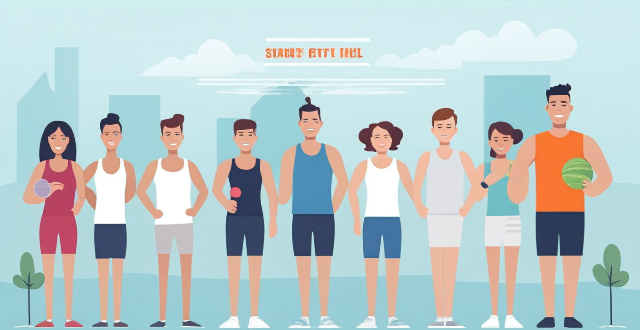
How does sports participation contribute to overall well-being and happiness ?
Participating in sports not only enhances physical fitness but also contributes significantly to overall well-being and happiness. This article explores the various benefits of sports participation, including improved physical health, mental health advantages, social connections, and personal growth. Regular sports engagement helps maintain and improve fitness levels, prevent chronic diseases, reduce stress, enhance cognitive function, and promote emotional stability. It also offers opportunities for building relationships, learning teamwork skills, setting personal goals, managing time effectively, and developing discipline and responsibility. Incorporating sports into our lives can lead to a holistic approach to well-being that includes mental health benefits, social connections, personal growth, and increased happiness and quality of life.

Can you recommend any reputable online sports coaching certification courses ?
The text provides recommendations for reputable online sports coaching certification courses. The recommended courses include ISSA Online Personal Trainer Certification, NASM Online Personal Trainer Certification, American Council on Exercise (ACE) Online Personal Trainer Certification, and National Academy of Sports Medicine (NASM) Online Performance Enhancement Specialist Certification. Each course is self-paced, offers interactive quizzes and assessments, covers various topics such as anatomy, nutrition, exercise technique, program design, and client assessment, and comes with a money-back guarantee if the final exam is not passed. The prices range from $499 to $799.

Can sports provide a platform for individuals to challenge themselves and reach their full potential ?
**Summary:** This essay posits that sports provide a comprehensive platform for individuals to challenge themselves and reach their full potential. It explores how sports offer psychological benefits such as mental toughness, goal setting, and confidence building; physiological benefits including improved physical fitness, skill development, and resilience; and social benefits like teamwork, leadership, and camaraderie. Personal stories of overcoming adversity further underscore the transformative power of sports in personal growth. The conclusion affirms that sports are not just about physical activity but are a means to unlock human potential holistically.

What is the difference between a personal trainer and a fitness instructor ?
The article discusses the differences between a personal trainer and a fitness instructor. Personal trainers design customized workout plans for individual clients, while fitness instructors lead group exercise classes. Personal trainers require certification from accredited organizations like NASM or ACE, while fitness instructors need certification from reputable organizations like AFAA or IDEA. Personal trainers often work in private settings with one-on-one clients, while fitness instructors typically work in public settings leading group classes. Both professions require dedication and continuous learning to stay up-to-date with the latest trends and techniques in the fitness industry.

What ethical considerations should be taken into account when reporting on athletes' personal lives ?
The text discusses ethical considerations in reporting athletes' personal lives, emphasizing respect for privacy, accuracy and fairness, consent and participation, handling sensitive topics with care, public interest, age and maturity, cultural sensitivity, and aftermath support. It suggests that journalists should avoid intrusion, verify information, ask for permission, handle sensitive topics with care, consider age and maturity, recognize cultural differences, provide resources for support, and follow up responsibly. The text concludes that reporting on athletes' personal lives requires a nuanced approach that prioritizes ethics over sensationalism to maintain integrity while informing the public about the human aspects of sports figures they admire.

How can I distinguish myself from others with a unique personal image ?
**How to Establish a Unique Personal Image** 1. **Identify Your Passions and Interests**: List your hobbies and reflect on your values. 2. **Develop Your Skills and Expertise**: Keep learning and specialize in a niche within your field. 3. **Craft Your Style**: Create a signature style and pay attention to personal grooming. 4. **Build Your Digital Presence**: Curate social media profiles and create a personal website or blog. 5. **Network with Like-minded People**: Join communities and attend relevant events. 6. **Showcase Your Achievements**: Compile a portfolio and collect testimonials. 7. **Stay True to Yourself**: Maintain authenticity and focus on self-improvement.

How do celebrities balance their personal brand with their professional image ?
Celebrities face the challenge of maintaining a cohesive image across their personal brand and professional endeavors. They achieve this by understanding the distinction between these two aspects, ensuring consistency in messaging, being transparent and authentic, leveraging social media effectively, collaborating with professionals, adapting to evolving perceptions, managing public perception during personal milestones, incorporating philanthropy, and embracing diversity in roles and endorsements. By employing these strategies, celebrities strive to present a unified front that resonates with fans and critics alike, ensuring their star power remains intact across both realms.

How do celebrities balance their professional and personal life to stay healthy ?
Balancing professional demands with personal well-being is a common challenge faced by celebrities. To maintain this equilibrium, they prioritize self-care through practices like meditation and therapy for mental health, and regular exercise and healthy eating for physical health. Setting boundaries, such as scheduled downtime and limiting public appearances, helps in separating work from personal life. Digital detoxes further aid in reducing stress from online interactions. Building a supportive network of family, friends, and professionals assists in managing daily stressors and offers emotional support. Pursuing hobbies and interests outside of their fame provides additional fulfillment. By implementing these strategies, celebrities can navigate the challenges of their profession while maintaining their health and well-being.

How can I create a sustainable workout plan to enhance my personal health ?
Creating a sustainable workout plan is crucial for enhancing personal health. To do so, start by setting realistic goals that are specific, measurable, attainable, relevant, and time-bound (SMART). Choose activities you enjoy and mix up your routine with different types of workouts to avoid boredom. Start slowly and gradually increase intensity while incorporating rest days to prevent injury and burnout. Track your progress using a journal or fitness app and stay consistent and accountable by finding support from an accountability partner or fitness community. By following these steps, you can create a sustainable workout plan that enhances your personal health while keeping you motivated and engaged in the long term.
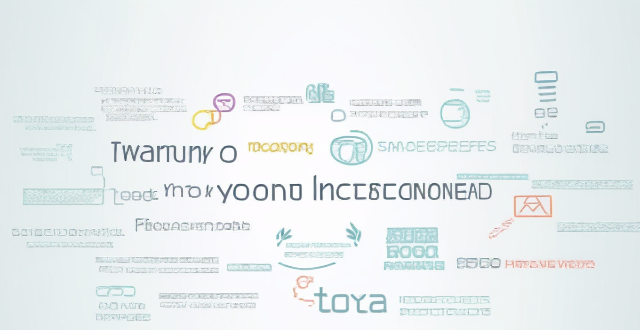
How can I protect my personal information online ?
In today's digital age, protecting your personal information online is crucial. To safeguard sensitive data, one should use strong and unique passwords, keep software and systems up-to-date, be careful with public Wi-Fi networks, be wary of phishing attacks, and limit the amount of personal information shared online. These steps can significantly reduce the risk of having personal information compromised online.

What role does nutrition play in maintaining personal hygiene ?
The article emphasizes the importance of nutrition in maintaining personal hygiene. It suggests consuming nutrient-rich foods, developing healthy dietary habits, and supporting the immune system through nutrition to improve overall health and hygiene.

How do I dress professionally as a woman without sacrificing my personal style ?
Dressing professionally as a woman doesn't mean sacrificing personal style. Here are some tips: stick to neutrals and classic colors, invest in quality basics, incorporate trendy pieces appropriately, pay attention to fit and cut, and accessorize wisely. By following these guidelines, you can create a wardrobe that reflects both your professionalism and personal style.

How does sports insurance work ?
Sports insurance is a specialized form of insurance that protects athletes and sports participants from financial losses due to injuries or accidents that may occur during physical activities. It provides coverage for medical expenses, lost wages, and other related costs associated with sports-related injuries. There are several types of sports insurance policies available, including personal accident insurance, liability insurance, equipment insurance, and travel insurance. Sports insurance typically covers a wide range of sports-related injuries and accidents, including medical expenses, disability, funeral costs, legal fees, equipment damage or theft, and travel expenses. The cost of sports insurance varies depending on several factors, including the type of sport, the level of risk involved, the policyholder's age and health status, and the amount of coverage desired.
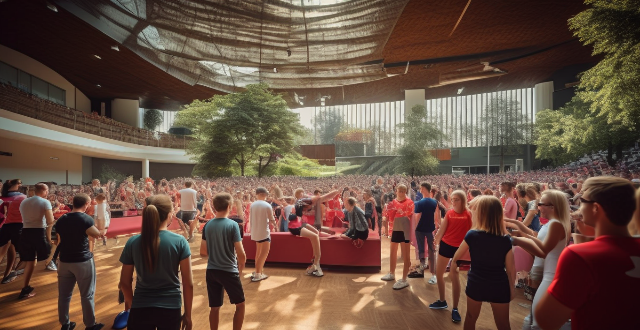
How do sports and religious beliefs intersect ?
The intersection of sports and religious beliefs is multifaceted, touching upon aspects of culture, morality, community, and ethics. Sports events often begin with prayers or invocations, seeking divine guidance or protection. Athletes may engage in private prayer or meditation before games to calm their nerves and focus their minds. Some athletes attribute their success to their faith and openly share their religious beliefs during interviews or on social media. Religious teachings often emphasize honesty and integrity, which translate to advocating against doping and cheating in sports. In cases of disputes or conflicts within sports teams, religious beliefs can guide approaches to reconciliation and forgiveness. Whether it's through rituals, values, personal expressions of faith, community building, or ethical considerations, sports offer a unique platform for religious beliefs to be lived out loud.
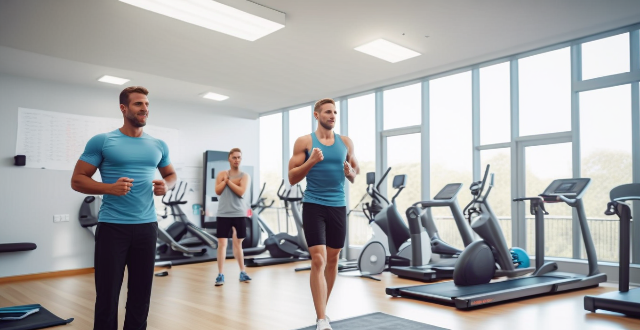
How does team sports impact psychological well-being ?
Participating in team sports can have a significant impact on an individual's psychological well-being. Team sports provide opportunities for social interaction, physical activity, and personal growth, all of which contribute to overall mental health. Social interaction reduces feelings of loneliness and isolation, while physical activity improves mood and reduces symptoms of anxiety and depression. Personal growth through learning new skills or overcoming challenges builds resilience and confidence. Team sports also provide a healthy outlet for stress relief and require discipline and time management skills that can translate into other areas of life. Overall, participating in team sports can improve mental health and quality of life.